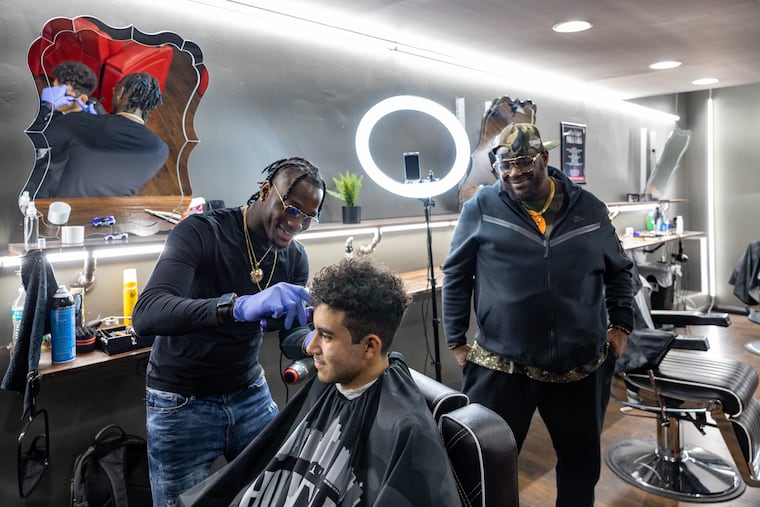$10,000 grants aim to help Philly barbershops and salons recover from pandemic-era struggles
The one-time grants will be designated for new equipment, technology upgrades, and social media marketing.

Barbershops and salons are the backbone of many communities in Philadelphia. It’s where people get a taste of entrepreneurship, where vital information is shared, and how some people make it through school.
“We had a young lady who was a shampoo girl at our shop. She attended West Catholic High School in the early 2000s, and her mother fell on hard times,” said Darryl Thomas, a Philly barber and owner of Philly Cuts Barbershop in West Philly. “We took up collections for her and encouraged people to call her school’s office and put some money on her tuition tab. Well, she graduated from West Catholic. Four years later, I come into work, and I see a Villanova University degree at my station.”
“That’s something that everyone played a part in, and that’s the community,” he added.
Barbershops and beauty salons like Philly Cuts play crucial roles in their neighborhood, from helping “Dreamers” attain citizenship and disseminating information about COVID-19 to simply being a safe place to talk with neighbors. COVID-19 precautions forced the industry to close up in the early years of the pandemic. It was a financial blow to some of the most crucial community spaces in the city.
“Throughout COVID, we could not participate in business because we’re not restaurants. We weren’t able to operate through the pandemic by way of takeout,” said Thomas, who saw revenue drop 70% to 80%. “It was very scary; it was very shocking. Barbershops and beauty salons are still struggling — we’re not out of the woods yet.”
In 2021, the city awarded one-time $5,000 grants to 159 businesses to help relieve the financial stress salons and barbershops were going through. Now, a second round of relief is here through the Salon and Barbershop Emergency Relief (SABER) program — this time providing $10,000 grants.
T The new grants are designed to help small businesses install new safety equipment, upgrade scheduling technology and payment systems, and invest in social media marketing. The Pennsylvania Professional Image Alliance (PPAI), a coalition of Philly barbershops and salons, founded in 2020, is helping the city’s barbershops apply for the grant in partnership with Beech Capital Venture Corp. The SABER program is possible through an investment from the Philadelphia Department of Commerce as a part of its equitable business growth strategies.
One-time $10,000 grants will be awarded on a first-come, first-served basis. Small-business owners can apply for the grant at beechcompanies.com/saber-grant-application.
If you need help applying or have questions, contact Ann Turner, president of PPAI and owner of Hair Du Jour salon in West Philly, at 445-225-9413 or pennproia2.0@gmail.com.
How do small businesses qualify for a grant?
These are the requirements:
Must be located in the city of Philadelphia.
Must be independently owned. (Not a part of a national chain or other single business entity with a revenue of more than $250,000 annually.)
Must earn income from the provision of barbering, cutting, styling, cosmetology, or braiding hair services.
Must show a negative financial impact from the COVID-19 pandemic.
Must have a business checking account.
Must have a federal tax identification number.
Must show a gross annual income of less than $250,000.
Must be prepared to show the latest tax returns: year 2021 and/or 2022.
Must have an industry-based license, commercial activity license, state identification/driver’s license, and completed ACH form (for direct deposit).